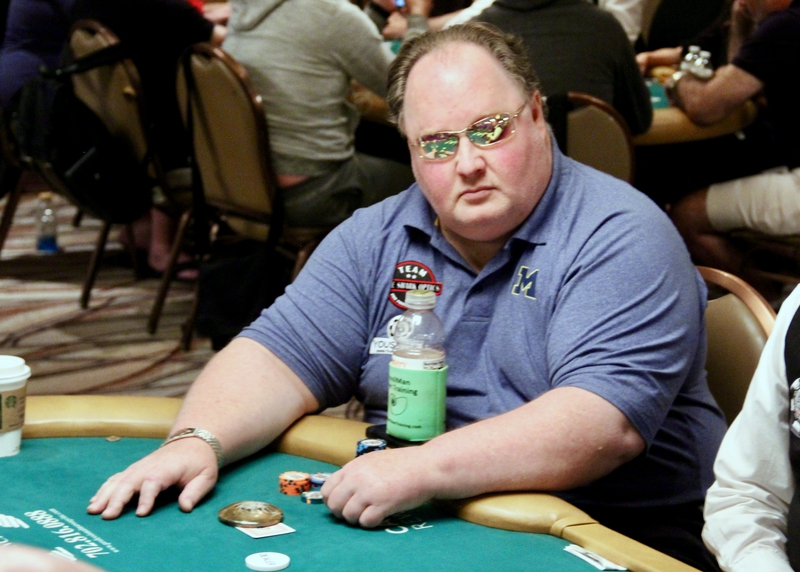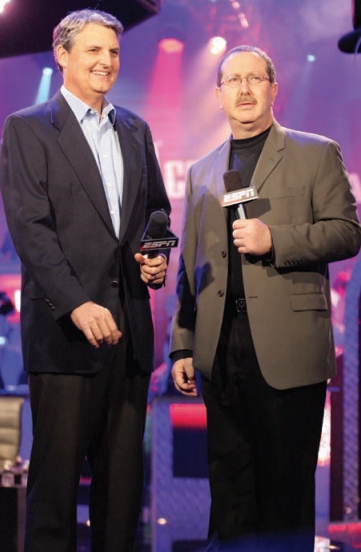






2004 Rewind: Taking Hits From Norman Chadby Greg Raymer | Published: May 17, 2023 |
|
|
 Please let me encourage you to reach out to me with article ideas and questions for future columns. You can tweet to me at
Please let me encourage you to reach out to me with article ideas and questions for future columns. You can tweet to me at @FossilMan, or send me a message at info@fossilmanpoker.com.
In 2019, I published FossilMan’s Winning Tournament Strategies, a 42-chapter book covering all of the basic concepts behind being a winning tournament player, as well as many of the more advanced strategies. This book could be compared to the lecture portion of my poker seminars. I have been working on a second book, however, and thought it should more resemble live hand labs.
For this book, I will go through several dozen hands I have played and break down each decision along the way. Although not yet finished, I thought it would be fun to provide excerpts of some of those hands here for Card Player readers.
Although I used to get asked about this event often, I don’t hear much about it anymore. Late in 2004, several months after the WSOP main event was completed, Harrah’s and ESPN put on the Tournament of Champions, a one-table, winner-take-all tournament, for $2 million.
It was an invitational event, not based upon a specific criterion, but was touted as consisting of the current champion plus the nine best players in the world. I was in seat 1, and then around the table was Phil Ivey, Daniel Negreanu, Annie Duke, Chip Reese, Johnny Chan, T.J. Cloutier, Phil Hellmuth, Doyle Brunson, and Howard Lederer.
I obtained the information about this hand from rewatching the DVD for the 2004 WSOP. Sadly, I am fairly certain the DVD is edited down from what was shown on TV. There is one key hand I recall seeing that is not on the recording, and there are probably more missing hands as well. Aside from that, much of the early play was not even shown on TV either.
About 20 minutes in, Lon McEachern and Norman Chad mention that I’m the surprise early chip leader (gee whiz guys, kind of insulting), yet only one of the pots I won to get to that point was shown on the broadcast. (If anybody has access to that footage somehow, I would love to see it.)
We were down to five players, and the blinds were up to 12,000-24,000 with a 4,000 ante. There was 2,000,000 chips in play, so the average stack was 400,000 at the time.
I was under the gun, and raised to 65,000 with 9 8
8 . Annie Duke was next to act, and moved all-in for 137,000 with A
. Annie Duke was next to act, and moved all-in for 137,000 with A 10
10 . The others folded, and I called.
. The others folded, and I called.
The board dramatically ran out 9 2
2 2
2 A
A 3
3 , giving her the double up. Norman Chad said my call was a meltdown, but as much as I love Norman, he is not very knowledgeable about no-limit holdem strategy (though he is very good at stud 8).
, giving her the double up. Norman Chad said my call was a meltdown, but as much as I love Norman, he is not very knowledgeable about no-limit holdem strategy (though he is very good at stud 8).
I started this hand with about 350,000 and was in third place behind Phil Hellmuth and Howard Lederer, who were in the blinds. Johnny Chan was in fourth, and Annie was the short stack again.
 We can certainly debate whether I should make an opening raise, first to act, with the two chip leaders in the blinds, with just 9-8 offsuit. In fact, it was almost certainly a mistake. At this point, I don’t have the chip lead I held for a long time, and the threat it carries. And while 9-8 offsuit is not a terrible hand, it has a lot less value than 9-8 suited.
We can certainly debate whether I should make an opening raise, first to act, with the two chip leaders in the blinds, with just 9-8 offsuit. In fact, it was almost certainly a mistake. At this point, I don’t have the chip lead I held for a long time, and the threat it carries. And while 9-8 offsuit is not a terrible hand, it has a lot less value than 9-8 suited.
Even though you only make a flush a small percentage of the time, suited hands have quite a bit more value, as they connect with more flops, giving you the power to continue more often. For example, a flop such as K-J-3 is horrible for my hand, but if I have 9 8
8 and the flop is K
and the flop is K J
J 3
3 , I can play the hand aggressively, knowing that if my semi-bluff fails, I can still make my flush and win the pot. Without a flush draw, my hand loses all value, other than as a pure bluff.
, I can play the hand aggressively, knowing that if my semi-bluff fails, I can still make my flush and win the pot. Without a flush draw, my hand loses all value, other than as a pure bluff.
If for any reason there was a strong chance I could raise here and win the blinds preflop, then my raise is fine. Since this was probably not very likely, I should have folded instead of raising.
Should Annie have gone all-in with A-10 offsuit? Let’s do the math. If she folds, she has 137,000. If she goes all-in and gets called by me, she will have either zero, or 330,000. This means she has to think she will win this pot more than 41.5% of the time. If my range is the top 10% of hands, then her raise is a small mistake, as she has less than 40% equity against that range. However, if my range is just slightly wider, the top 12% of hands, now she is getting the right price for this risk.
She also must consider the three other players yet to act. There is a chance one of them wakes up with a premium hand, which is bad news for her. On the plus side, if one of them now four-bet shoves, I am going to fold. The pot she can win will now be about 360,000 and 380,000, depending upon who raises. This means she only needs something like 37% equity for this to be a profitable situation. However, the downside is she is going to be up against a much stronger range, most likely a top 3-5% hand, against which she will have less than 30% equity.
Once the others fold, my call is automatic. Despite what Norman said, as well as the buzz at the table, this call is clearly correct.
It is honestly amusing to look back now and see everybody’s reactions. Johnny Chan even said something about me calling with 9-8, that maybe it was my lucky hand. No, it is not. Let’s just do the math.
It costs me 72,000 to call, and there is 258,000 in the pot. At those pot odds, I only need to win 22% of the time. Even if my cards magically changed to 7-2 offsuit, I would have called for that price. Even if her entire range is only pairs from A-A down to 7-7, I’m getting the right price.
While my first raise was probably a small mistake, the call was automatic. Folding there would only be correct in hindsight. But then again, if I got to use hindsight, then I never would have made the first mistake of playing the hand in the first place. (Perhaps if I hadn’t, Annie wouldn’t have gone on to win the tournament.)
Have fun and play smart! ♠
Greg Raymer is the 2004 World Series of Poker main event champion, winner of numerous major titles, and has more than $7 million in earnings. He is the author of FossilMan’s Winning Tournament Strategies, available from D&B Publishing, Amazon, and other retailers. He is sponsored by Blue Shark Optics, YouStake, and ShareMyPair. To contact Greg please tweet @FossilMan or visit his website.
Features
Tournaments
Strategy
Commentary & Analysis